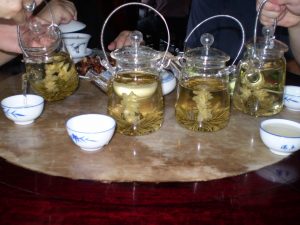Jasmine is a flower that has been used in traditional medicine for many generations. It is most closely associated with the Chinese medical tradition, where it is typically used to make a tea. Jasmine tea joins many other forms of green tea and oolong tea in having clear benefits that conventional medical science has uncovered and expanded upon in recent years.
 No matter how you choose to take jasmine, its most important benefit is probably the large amount of antioxidants present in its chemical makeup. Antioxidants are among the most important chemicals a person can integrate into their diet, because they help prevent the severe cellular damage that can be caused by free radicals.
No matter how you choose to take jasmine, its most important benefit is probably the large amount of antioxidants present in its chemical makeup. Antioxidants are among the most important chemicals a person can integrate into their diet, because they help prevent the severe cellular damage that can be caused by free radicals.
Free radicals are uncharged molecules with a “free” electron that can break free and damage a cell within the body. The damage to the cell is severe, and can corrupt the DNA information the body uses to generate a new copy of the cell when it dies. Antioxidants are the simplest way to reduce the presence of free radicals in the body.
Jasmine is considered to have a pleasing and calming effect, especially noticeable when it is used as a tea. It has mild sedative qualities that have been confirmed by the European Journal of Applied Physiology, a prestigious medical journal. In studies conducted by this publication, jasmine tea consumption was associated with a significant reduction in heart rate.
Jasmine is being investigated for its potential role in the reduction of cancer. While antioxidants are believed to retard the process of cancer development, jasmine may be unique in its ability to combat esophageal cancer.
Jasmine has also been used in a number of forms to help people who suffer from sleep disturbances. Insomnia patients may fall asleep faster and sleep more deeply after using jasmine.
With so many different uses, jasmine is certainly one of the most versatile flowers for healing.